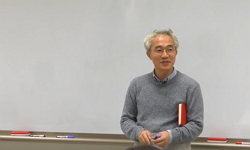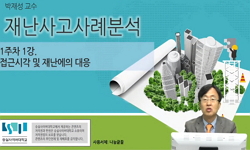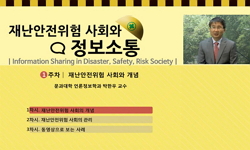Modern society is faced with multiple uncertainties from internal or external events. Although some disasters may be preventable in some degree, global health issues like COVID-19 or natural disasters including earthquakes and floods cannot be fully p...
http://chineseinput.net/에서 pinyin(병음)방식으로 중국어를 변환할 수 있습니다.
변환된 중국어를 복사하여 사용하시면 됩니다.
- 中文 을 입력하시려면 zhongwen을 입력하시고 space를누르시면됩니다.
- 北京 을 입력하시려면 beijing을 입력하시고 space를 누르시면 됩니다.

시스템 사고를 이용한 커뮤니티 리질리언스 구성요소 간 인과구조 탐색 = Analysis on Causal Structure among Components of Community Resilience Using System Thinking
한글로보기https://www.riss.kr/link?id=A107354842
- 저자
- 발행기관
- 학술지명
- 권호사항
-
발행연도
2021
-
작성언어
-
-
주제어
재난 ; 커뮤니티 리질리언스 ; 자원의 내구성 ; 적응력 ; 시스템 사고 ; 인과지도 ; Disaster ; Community Resilience ; Resources Robustness ; Adaptive Capacity ; System Thinking ; Casual Loop Diagram
-
등재정보
KCI등재
-
자료형태
학술저널
- 발행기관 URL
-
수록면
59-79(21쪽)
-
KCI 피인용횟수
1
- DOI식별코드
- 제공처
-
0
상세조회 -
0
다운로드
부가정보
다국어 초록 (Multilingual Abstract)
Modern society is faced with multiple uncertainties from internal or external events. Although some disasters may be preventable in some degree, global health issues like COVID-19 or natural disasters including earthquakes and floods cannot be fully predictable accurately.
The paper explores the concept of “Community Resilience”, which allows the society to recover to a better-than-before status upon facing an unavoidable disaster. Due to complex and dynamic features of a local community, it is difficult to calculate variables affecting Community Resilience as previous studies sought to identify its components and evaluation methods in various aspects.
The purpose of this paper is to analyze causal relationship among the core elements of community resilience through Causal Loop Analysis. The results are as follows. First, when a disaster occurs, resource performance, resource diversity, and resource redundancy have a positive feedback structure for community resilience. Second, resource diversity affects institutional memory, and as such experiences and information are accumulated, the connectedness is strengthened. In addition, as institutional memories accumulate, innovative learning is more likely to be systematic and continuous. Third, innovative learning has a positive effect on the formation of consensus among the members and the internal bonds of the community, which in turn affects interactions with external organizations with a positive feedback on the resource performance.
As a result, a community with high community resilience show less damage and shorter recovery times than those with low community resilience. That is, even if a disaster of similar type and magnitude occurs, the damage scale and recovery time may differ depending on the level of community resilience in the community. In order to reinforce community resilience, it is important to create a virtuous cycle amongst the components of Community Resilience.
참고문헌 (Reference)
1 김훈, "한국사회의 자살예방을 위한 인과지도 분석연구: 노년층을 중심으로" 한국시스템다이내믹스학회 21 (21): 79-108, 2020
2 주필주, "커뮤니티 리질리언스 관점에서 본 한⋅일 재난대응체계 비교 연구–경주지진과 구마모토지진 사례를 중심으로–" 서울시립대학교 2019
3 하현상, "지역사회 재난 리질리언스(Community Disaster Resilience) 연구의 비판적 고찰과 행정학적 제언" 빈곤문제국제개발연구원 23 (23): 409-464, 2014
4 김현주, "지역사회 방재리질리언스 프레임워크개발" 국립방재연구원 2012
5 송혜승, "적응순환이론의 적용을 통한 저층주거지 지역사회의 리질리언스 고찰–서울시 장수마을을 대상으로–" 한양대학교 2018
6 김영근, "재해 리질리언스 : 사전부흥으로 안전학을 과학하자" 한국학술정보(주) 2018
7 고민서, "재난안전관리 개선을 위한 효율적인 민-관 연계 방안 연구" 광운대학교 2017
8 정병도, "재난관리론" 동화기술 2015
9 이종열, "재난관리론" 대영문화사 2014
10 강상준, "자연재해로부터의 지역사회 회복탄력성 도입방안" 경기개발연구원 2013
1 김훈, "한국사회의 자살예방을 위한 인과지도 분석연구: 노년층을 중심으로" 한국시스템다이내믹스학회 21 (21): 79-108, 2020
2 주필주, "커뮤니티 리질리언스 관점에서 본 한⋅일 재난대응체계 비교 연구–경주지진과 구마모토지진 사례를 중심으로–" 서울시립대학교 2019
3 하현상, "지역사회 재난 리질리언스(Community Disaster Resilience) 연구의 비판적 고찰과 행정학적 제언" 빈곤문제국제개발연구원 23 (23): 409-464, 2014
4 김현주, "지역사회 방재리질리언스 프레임워크개발" 국립방재연구원 2012
5 송혜승, "적응순환이론의 적용을 통한 저층주거지 지역사회의 리질리언스 고찰–서울시 장수마을을 대상으로–" 한양대학교 2018
6 김영근, "재해 리질리언스 : 사전부흥으로 안전학을 과학하자" 한국학술정보(주) 2018
7 고민서, "재난안전관리 개선을 위한 효율적인 민-관 연계 방안 연구" 광운대학교 2017
8 정병도, "재난관리론" 동화기술 2015
9 이종열, "재난관리론" 대영문화사 2014
10 강상준, "자연재해로부터의 지역사회 회복탄력성 도입방안" 경기개발연구원 2013
11 전대욱, "시스템의 회복성에 대한 이론적 검토와 시스템 다이내믹스 방법론의 적용" 한국시스템다이내믹스학회 14 (14): 5-30, 2013
12 문태훈, "시스템사고를 이용한 정책과 지속가능발전목표(SDGs)의 인과구조 탐색 -경기도 정책과제와 경기도 지속가능발전 목표(G-SDGs)를 중심으로-" 한국시스템다이내믹스학회 21 (21): 5-30, 2020
13 최남희, "새로운 지역개발전략으로서의 회복탄력성의 요소와 인과순환적 원형구조에 관한 연구" 한국시스템다이내믹스학회 16 (16): 155-178, 2015
14 송윤석, "대도시 재난관리조직의 효율성에 영향을 미치는 요인 연구" 한국도시행정학회 22 (22): 225-243, 2009
15 전은영, "기후변화에 대응하기 위한 커뮤니티 리질리언스 평가지표 개발과 적용" 국토지리학회 51 (51): 47-58, 2017
16 김동현, "기후변화 적응과 재난, 도시의 리질리언스" 17 (17): 27-32, 2017
17 전대욱, "가리왕산 스키장 건설을 둘러싼 논쟁과 생태관광의 회복력(resilience)에 대한 시스템 사고" 한국시스템다이내믹스학회 15 (15): 61-79, 2014
18 海上智昭, "行動科学⋅社会科学的な災害の概念定義の整理-1920年以来の軌跡と現在の課題-" 22 (22): 199-218, 2012
19 Lu, P, "Understanding the notion of resilience in spatial planning: A case study of Rotterdam, The Netherlands" 35 : 200-212, 2013
20 Cheuy, S., "The case for cultivating community resilience adapting to challenges, sustaining hope" Tamarack Institute 2016
21 Walker, B., "Resilience thinking: sustaining ecosystems and people in a changing world" Island Press 2012
22 Arbon, P., "How do we measure and build resilience against disaster in communities and households?"
23 Cutter, S. L., "Disaster Resilience Indicators for Benchmarking Baseline Conditions" 7 (7): 1-22, 2010
24 Brown, V. J., "Community Resilience to Climate Change Disasters: Comparing how Rotterdam and New York City approach community resilience in Policy" Universiteit Utrecht 2016
25 Norris, F. H., "Community Resilience as a Metaphor, Theory, Set of Capacities, and Strategy for Disaster Readiness" 41 : 127-150, 2008
26 Longstaff, P. H., "Building Resilient Communities: A Preliminary Framework for assessment" 6 (6): 1-23, 2010
27 Chandra, A., "Building Community Resilience to Disasters: A Way Forward to Enhance National Health Security" 2011
28 Sharifi, A, "A critical review of selected tools for assessing community resilience" 69 : 629-647, 2016
동일학술지(권/호) 다른 논문
-
주출산 여성인구 변화의 동태성에 대한 시뮬레이션 모델링: 출생아수에 미치는 피드백구조와 영향
- 한국시스템다이내믹스학회
- 최남희 ( Choi Namhee )
- 2021
- KCI등재
-
코로나19에 대응하는 세분화된 사회적 거리두기 정책의 효과 분석
- 한국시스템다이내믹스학회
- 김동규 ( Kim Dong-kyu )
- 2021
- KCI등재
-
유튜브 성장 분석: 유튜브 성장 촉진과 억제의 인과순환구조 분석을 중심으로
- 한국시스템다이내믹스학회
- 전재호 ( Juhn Jaeho )
- 2021
- KCI등재
분석정보
인용정보 인용지수 설명보기
학술지 이력
| 연월일 | 이력구분 | 이력상세 | 등재구분 |
|---|---|---|---|
| 2026 | 평가예정 | 재인증평가 신청대상 (재인증) | |
| 2020-01-01 | 평가 | 등재학술지 유지 (재인증) |  |
| 2017-01-01 | 평가 | 등재학술지 유지 (계속평가) |  |
| 2013-01-01 | 평가 | 등재 1차 FAIL (등재유지) |  |
| 2010-01-01 | 평가 | 등재학술지 선정 (등재후보2차) |  |
| 2009-01-01 | 평가 | 등재후보 1차 PASS (등재후보1차) |  |
| 2008-01-01 | 평가 | 등재후보학술지 유지 (등재후보1차) |  |
| 2007-01-01 | 평가 | 등재후보학술지 유지 (등재후보1차) |  |
| 2005-06-29 | 학회명변경 | 한글명 : 한국시스템다이네믹스학회 -> 한국시스템다이내믹스학회영문명 : 미등록 -> Korean System Dynamics Society |  |
| 2005-01-01 | 평가 | 등재후보학술지 선정 (신규평가) |  |
학술지 인용정보
| 기준연도 | WOS-KCI 통합IF(2년) | KCIF(2년) | KCIF(3년) |
|---|---|---|---|
| 2016 | 0.55 | 0.55 | 0.55 |
| KCIF(4년) | KCIF(5년) | 중심성지수(3년) | 즉시성지수 |
| 0.56 | 0.48 | 0.599 | 0.39 |





 KISS
KISS






